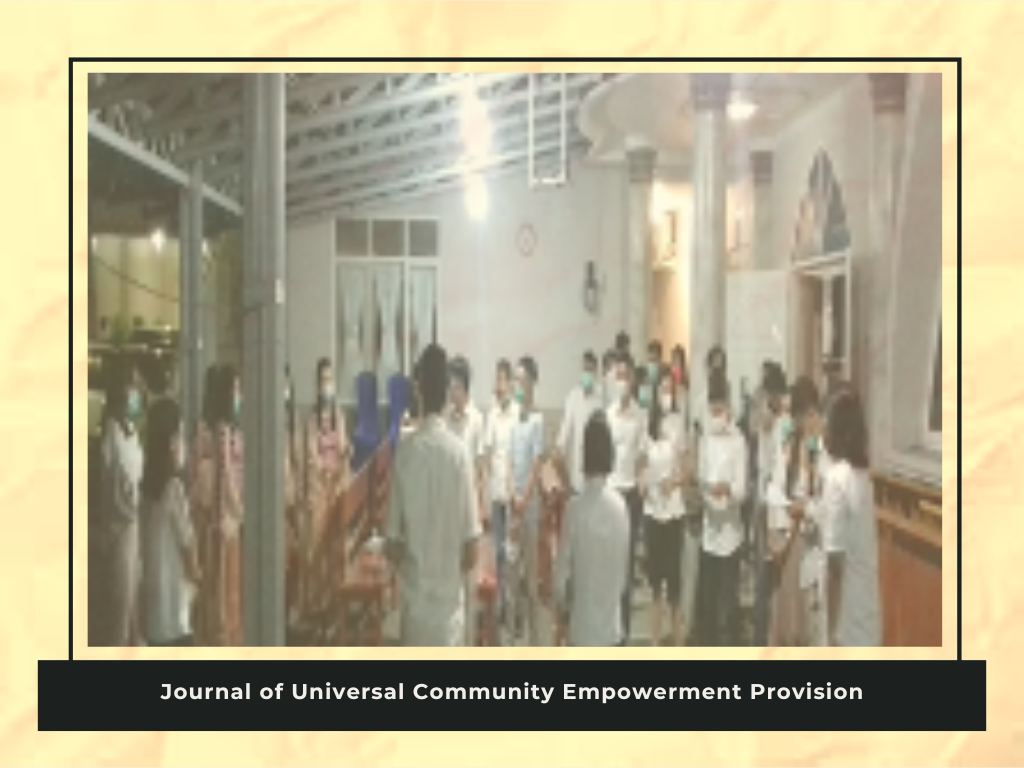Implementation of Entrepreneurship in the Field of Tourism in Youth GMIMLogos Bumi Kilu Permai
DOI:
https://doi.org/10.55885/jucep.v4i1.337Keywords:
Entrepreneurship, Tourism, BusinessAbstract
Tourism-based entrepreneurship training is a simple service among young people or the millennial generation because they are very quick to adapt and adapt to the current situation and developments in the modern era. However, in its implementation it requires high levels of innovation and creativity to obtain new and useful business opportunities that can be carried out both individually and in groups. Tourism is a science that develops according to the demands and development of human civilization as well as a touch of creativity in the process of arranging and managing tourist areas with all the supporting facilities and infrastructure. The service method is carried out descriptively, in which the service person describes the service by interviewing the potential of tourist attractions in Manado and its surroundings, interviews regarding the participant's attraction to the tourist objects mentioned and/or known and visited. On this basis, knowledge and insight regarding entrepreneurial efforts in the tourism sector is given, where the field of entrepreneurship in the tourism sector is a very good field and has the potential to be pursued by young people. The aim of this service is to encourage and motivate the creativity and innovation of the youth of the GMIM Logos Congregation to elaborate their personal potential and abilities along with insight into their tourism knowledge and technological capabilities. This service applies creativity in the tourism sector for them to design itinerary products both in the city of Manado, Minahasa and the surrounding areas. This motivation will continue to attract attention and be supported by both the youth themselves, the church and the wider community. In the future, we hope to become a product provider, especially for internal activities in the congregation and it is hoped that business expansion will occur by improving relations with the outside world.
References
AlMomani, A. A., & Alomari, K. F. (2021). Financial Technology (FinTech) and its role in supporting the financial and banking services sector. International Journal of Academic Research in Business and Social Sciences, 11(8), 1793-1802.
Autio, E., Mudambi, R., & Yoo, Y. (2021). Digitalization and globalization in a turbulent world: Centrifugal and centripetal forces. Global Strategy Journal, 11(1), 3-16.
Chaimaa, B., Najib, E., & Rachid, H. (2021). E-banking overview: concepts, challenges and solutions. Wireless Personal Communications, 117, 1059-1078.
Despotović, A., Parmaković, A., & Miljković, M. (2023). Cybercrime and cyber security in fintech. In Digital transformation of the financial industry: approaches and applications (pp. 255-272). Cham: Springer International Publishing. https://doi.org/10.1007/978-3-031-23269-5_15
Kaftan, V., Kandalov, W., Molodtsov, I., Sherstobitova, A., & Strielkowski, W. (2023). Socio-economic stability and sustainable development in the post-COVID era: lessons for the business and economic leaders. Sustainability, 15(4), 2876.
Manawar, A., Lukita, C., & Meria, L. (2023). The Evolution of Financial Technology in Indonesia. Startupreneur Business Digital (SABDA Journal), 2(2), 192-206. https://doi.org/10.33050/sabda.v2i2.367
Noor, M., Fourqoniah, F., & Aransyah, M. F. (2020). The Investigation of financial inclusions, financial literation, and financial technology in Indonesia. Jurnal Perspektif Pembiayaan Dan Pembangunan Daerah, 8(3), 257-268. https://doi.org/10.22437/ppd.v8i3.9942
Norboyeva, N. (2020). The role of the digital economy in the development of information and communication technologies. Архив научных исследований, (21).
Shankar, A. (2021). How does convenience drive consumers' webrooming intention?. International Journal of Bank Marketing, 39(2), 312-336.
Sima, V., Gheorghe, I. G., Subić, J., & Nancu, D. (2020). Influences of the industry 4.0 revolution on the human capital development and consumer behavior: A systematic review. Sustainability, 12(10), 4035.

Downloads
Published
How to Cite
Issue
Section
License
Copyright (c) 2024 Journal of Universal Community Empowerment Provision

This work is licensed under a Creative Commons Attribution-ShareAlike 4.0 International License.














